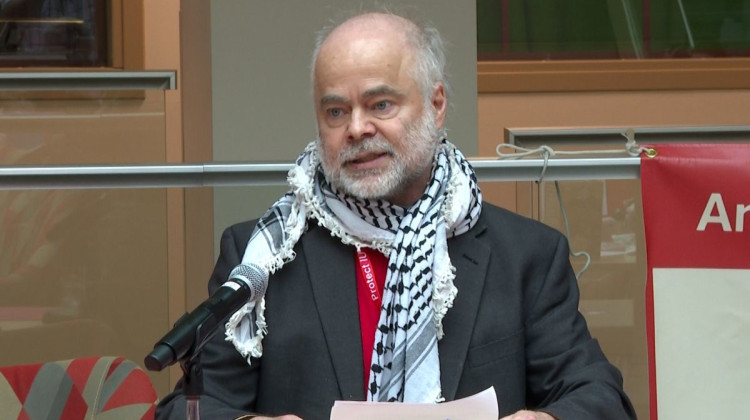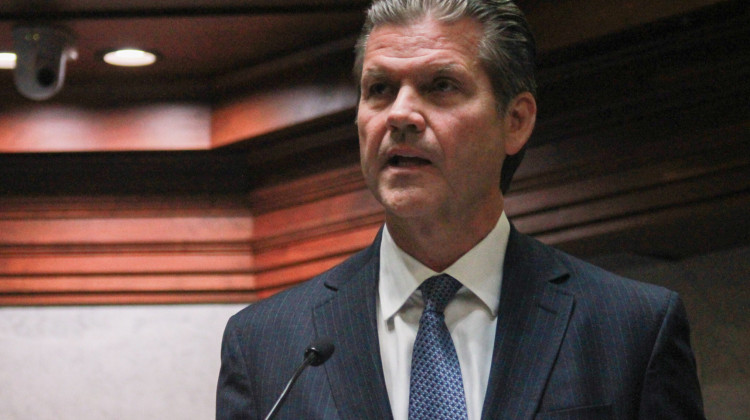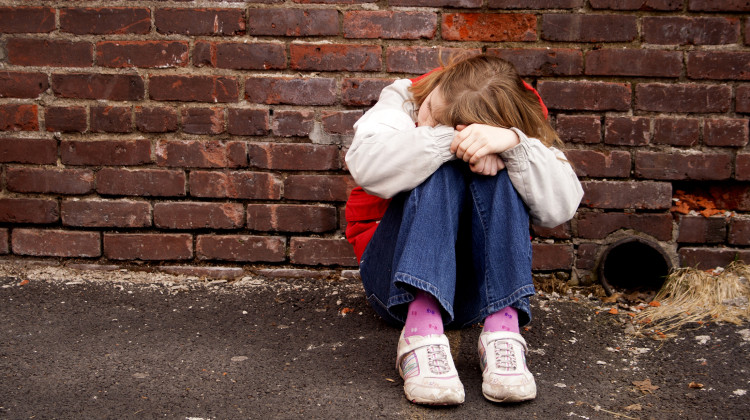A combination of factors are contributing to an unsettled school atmosphere as students skip class, act out and some are even suspected of stealing a teacher’s car
Students exit a stairwell and run down a second floor hall at Arlington Community High School as they try to elude an IPS police officer on Sept. 4, 2015. Principal Stan Law has described this part of the school as a "hot spot" of student misbehavior. Photo: Eric Weddle/WFYI Public Media
After three years under management of a private company, Arlington Community High School has returned to Indianapolis Public Schools. It’s the first school under state takeover to transition back to its home district and school leaders are under pressure from the community and state to make it work. In the series A New Day, WFYI education reporter Eric Weddle is spending a year reporting from inside the school on its successes and challenges.
Principal Stan Law has spent only a few days observing teachers and giving them feedback since school began six weeks ago. He knows that's crucial support educators at Arlington Community High School need as some are fresh out of college.
Instead, he carries a bullhorn and joins three IPS police officers and other staff who fan out across the school’s expansive corridors to hunt down dozens of students daily. These are kids skipping class, vandalizing the building, smoking marijuana and just ignoring the rules and their education.
On a recent day, Law is walking along D Hall on the second floor -- it’s a hot spot where kids can move up and about the building with little notice -- when he hears someone in the stairwell.
Law creeps up the steps.
“I knew it was you, little rascal! Don’t worry, I got you,” Law shouts as the student runs away onto the third floor. “The one I was just talking about … that’s him. Can’t trust him as far as I can see him.”
Law is trying to clamp down on these “runners” -- students, sometimes in large groups, who literally run free in this 380,000 square-foot school on the city's northeast side. That’s the size of an IKEA store for thousands of customers.
But at Arlington there’s just 630 students.
A combined middle and high school with this low enrollment has an equally lean crew of educators and staff. Trouble is, there’s not enough of them to control the oversized mischief that can strike each day, let alone offer intense remedial lessons and provide counsel and support to students' behavior and personal issues. Instead, administrators, teachers and academic coaches give up planning periods and their regular assignments for this daily cat-and-mouse game.
So Law is asking the Indianapolis Public Schools central office for more than 20 additional staff to help cement Arlington’s culture, one inteded to be: scholarship, self-control, respect, and doing the right thing.
But that won’t solve the question to what those inside, and outside, of the school are asking: why is Arlington having this trouble?

Principal Stan Law questions a large group of female students who crossed his path on the first floor of Arlington on Sept 4, 2015. The students were not in class and Law didn't believe the excuses they gave. Photo: Eric Weddle/WFYI Public Media.
But the emerging profile of the Arlington student body shows where more support and focus is needed:
- At least 40 percent of Arlington students in 7th-to-12th grade have special education needs based on their IEP, or individualized education program. That’s nearly triple the state’s rate of 15 percent of total students, and double the 21 percent district rate at IPS.
- 42 percent of seventh graders are reading at a third grade level or below. Another 36 percent are one or two years behind in reading skills. Students in other grades are also lagging.
- Up to 100 Arlington students are “very active” in the justice system, Law estimates, with some facing pending juvenile and adult cases.
- Students are coming to Arlington from a mix of traditional public and charter schools and other school corporations.
Add all those students into Arlington, basically a school in its first year with a student body and staff unfamiliar to the other, and there is bound to be an adjustment period, Law says.
'Antisocial behavior'
Yet students have told WFYI Public Media that they're resigned to the current atmosphere continuing.
An accounting of incidents at the school show that students are finding the opportunities during the day to act out, such as when: the athletic training room and athletic director’s office were broken-into and equipment destroyed; fire extinguishers sprayed; and fire alarms pulled so often that it seems normal to hear that piercing tone.
Staff have been pushed and otherwise assaulted by students.
There are fights in the school, including when an adult, a 19-year-old, snuck into the building to attack a student.
Read More: Arlington Snapshot: 'All Activities Are Cancelled'
A teacher’s car was even stolen out of the parking lot during class. Police suspect students were involved. The car has not been found.
In August, around 100 out-of-school suspensions were handed out at Arlington -- mostly for fighting and skipping class. And that’s about how many students Law believes is responsible for the ongoing trouble.
“The rest of our students are ‘regular kids’ so to speak. I don't want any of these antisocial behaviors to impact them in any kind of negative way. That is why we really try and hit it hard and why we want more adequate supervision,” Law says.
He has asked the IPS central office for at least 20 more staff, including 13 to focus on student behavior, discipline and safety. Another six would focus on special education needs.
It’s unknown yet how the district will respond. Other schools need help too. And IPS faces a potential $16 million reduction in state funding the next two years.
'Either you got better or you got worse'
If additional staff is approved, it’ll be a relief for Steve Mooreman -- the one-time NFL player and Arlington’s football coach. He also oversees the “GLC”-- that’s the guidance learning center. It’s become a sort of an in-school detention where students are sent for skipping or disrupting class.
Some days, more than 40 students could wind up in the GLC during one period -- and Mooreman is often the only one in charge.
Mooreman will take the opportunity to push some students with questions in the hope they will realize their mistakes. One day during the third week of class, he quizzed three male teens on current events nationally and in Indianapolis.
The response? Silence.
“There is only two things that can happen to you when you come to school -- either you got better or you got worse. There is no inbetween,” he tells them. “Either I got better or I got worse. But for the last three weeks none of you three can honestly say you got better.”
Mooreman, who has experience working in correctional facilities, says school staff have to gain the students’ trust in order to change bad behaviors. Two weeks later, he says, slowly it’s happening.
“The kids want us to be there in the morning. They don't want us to be that absent guy that’s not here,” he said. “So, I'm starting to see that and I just think that -- I think the administration is doing a heck of a job, man, I really do. I mean this is tough.”
There has been some postive developments.
On Aug. 31 a "tardy room," another detention area, was created to deal with students skipping or being late to first period class at 7:30 a.m. That first day 140 students were caught. By last week, only 45-to-50 students were being swept up -- an improvement, Law says.
‘I want people to know that I went here’
Briella Tomlinson, a dedicated volleyball player and Arlington senior, is just tired of the nonsense. She is waiting for the Arlington atmosphere to change but she is not holding her breath.
She’s seen Arlington run by IPS, the charter company and now IPS again.
“Once Ed Power took over, which was my freshman year, it was calm,” she says. “But now, that it is back to IPS, it is just crazy for no reason. People just do a lot for no reason.”
And by “no reason,” she means, the thousands of dollars of damage done to the athletic training room. Or a few days later, on Aug. 26, when a confrontation between angry parents and staff, and a student and Law, resulted in the school being shut down after the final bell and all activities cancelled, including volleyball practice.

"I’m livid right now. I can’t begin cleaning this. They hurt every athlete that is in this school," said athletic trainer Ashley Oliver on Aug. 24, 2015. Thousands of dollars in damage was done to the Arlington athletic training center during the school day by students. Previously the atheltic director's office was vandalized. It turned out, a student had stolen a set of keys from a staff member. Photo: Eric Weddle / WFYI Public Media
Too many people, she says, have no self control.
Tomlinson expects Law and other staff to fix these problems but wonders if it is too late.
Students need a reason to enjoy school -- more clubs, more activities, something to make losing the privilege enough to think twice before acting stupid, she says.
Tomlinson has the focus and drive to block it all out. She’s preparing for the ASVAB test, Armed Services Vocational Aptitude Battery, so she can join the military before setting sights on law school.
She's not going to let other students get in her way, she says. Like two weeks ago when a fight happened outside her AP English class.
“That whole class -- there were 12 of us in there -- we just sat there because were were so used to it,” she says. “Let's continue to work.”
Tomlinson wanted to stay at Arlington when the state Board of Education last year agreed to let IPS retake management of the school after Tindely Accelerated Schools, formerly known as Ed Power, could no longer afford to do so.
For all of her frustration and anger with Arlington, she is proud of the school and felt a bond with other athletes from past years.
She wants to be Arlington’s student body president and haul home a box of awards on senior night. She’s looking forward to prom.
But most of all, she wants to be an Arlington alumna.
“I want to do a lot of things as far as the school goes so when I leave other people will be 'this was done last year' and evolve off of that. That is what I want to do. And I want people to know that I went here,” she says. “Good people come out of bad places. There is no success without struggle.”
Contact WFYI education reporter Eric Weddle at eweddle@wfyi.org or call (317) 614-0470. Follow on Twitter: @ericweddle.
 DONATE
DONATE






 Support WFYI. We can't do it without you.
Support WFYI. We can't do it without you.